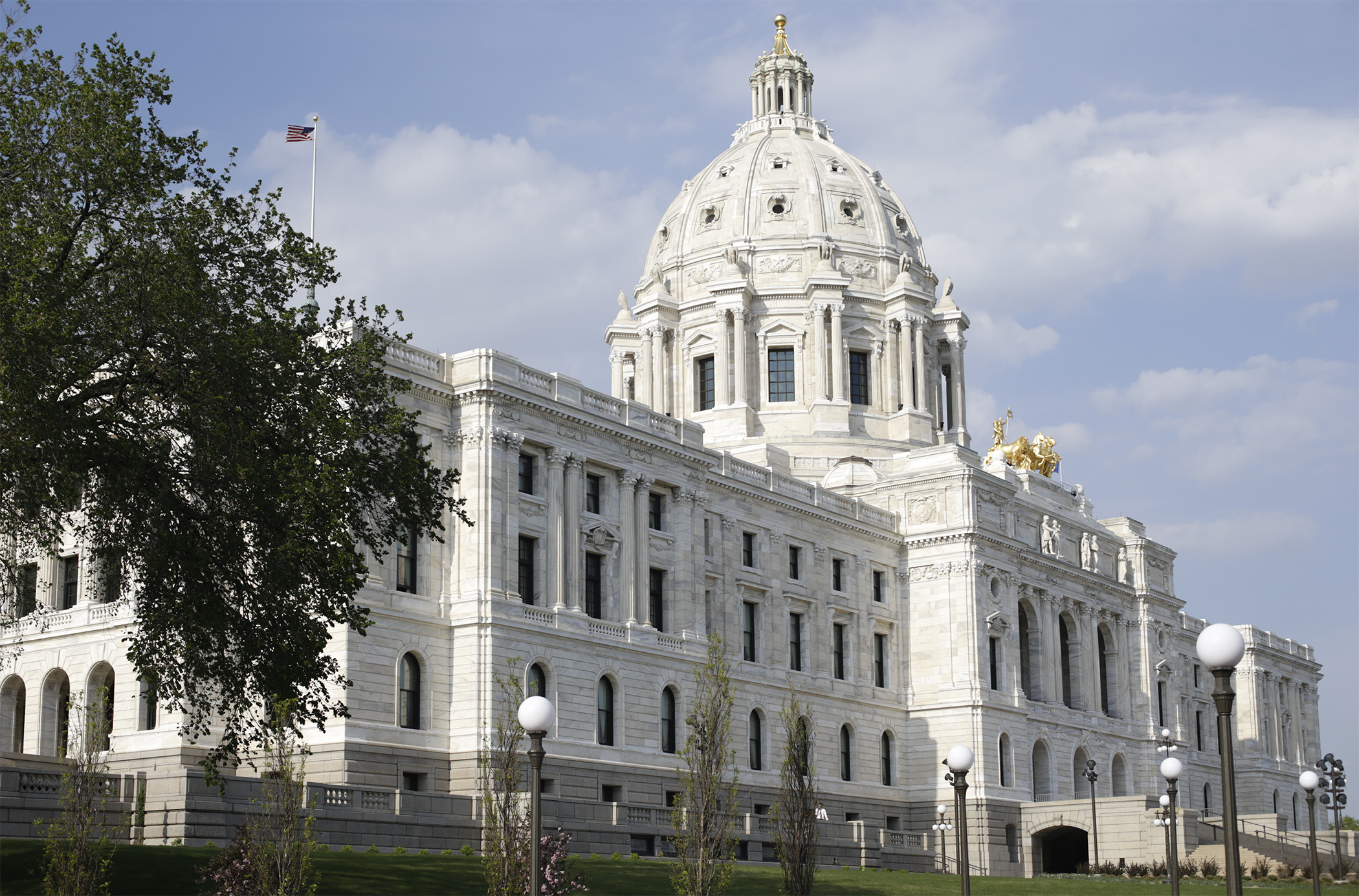House omnibus tax bill awaits budget targets

The omnibus taxes bill is ready to go. So what now?
That question hovered over Friday morning’s meeting of the House Taxes Committee. Normally, the next step would be approving it in committee, sending it to the floor, passing it there, then on to conference committee to reconcile it with the Senate’s version. But there’s a problem: budget targets.
Tuesday’s new state budget projections – and where federal aid should figure into spending calculations – have placed the proceedings in something of a holding pattern. Now it’s up to legislative leaders to pass on to committees some fiscal parameters. And the taxes bill is the one responsible for the revenue end of the equation.
So Friday’s hearing on the omnibus tax bill became more informational, with explanations of its provisions, the Revenue Department commenting, testifiers expressing concerns, and committee members asking questions.
HF3389, sponsored by Rep. Paul Marquart (DFL-Dilworth), the division chair, has been replaced by a delete-all amendment.
“The reason we’re hearing this is to give us some flexibility so we can move quickly when leadership comes up with some targets,” Marquart said. “We’re already talking with the Senate, but when will markup occur, when will a floor vote happen, that we don’t know.”
The bill’s companion, SF3843, sponsored by Sen. Roger Chamberlain (R-Lino Lakes), has been passed by the Senate.
“There is much work to be done, probably this summer and into the fall,” Marquart said. “We’re trying to bridge the gap, then move into the recovery stage. With that in mind, $667 million in the bill is set aside for local governments. … But it’s a bipartisan bill that shows that a little bit of help can make a big difference.”
As examples, Marquart cited such provisions as making the student loan credit refundable, increasing deductions for charitable giving, and providing partial conformity to federal law on Section 179 expensing for like-kind exchanges, a big issue for farmers who were hit with large tax bills when they upgraded equipment.
Here are some of the chief changes to state tax law contained in the bill:
Individual income and corporate franchise taxes
The bill would:
- retroactively allow full section 179 expensing on like-kind exchanges for tax years 2018 and 2019;
- establish a subtraction for volunteer driver reimbursements;
- make the student loan credit refundable;
- exclude student loans discharged due to death or disability in 2018 from state taxes; and
- require the Revenue Department to complete a report on free filing options.
Property taxes and aids
Most of these changes were part of the mini-omnibus passed by the House Property and Local Tax Division Wednesday. Among the provisions are:
- exempting certain tribal-owned land;
- allowing additional qualifying relatives eligible for agricultural homesteads;
- creating a classification for short-term rental property;
- allowing counties to choose a second settlement date for first-half property tax payments;
- providing a property tax deferral for an elderly living facility;
- providing 2019 local government aid penalty forgiveness for the cities of Roosevelt and Sargeant; and
- allowing the spouse of a deceased veteran a onetime transfer of the disabled veterans’ homestead exclusion.
Sales and use taxes
Among the alterations in state law would be:
- fixing a sales tax exemption for sales made by student-run organizations needed because of a school accounting change;
- providing a number of refundable sales tax exemptions for construction of public safety facilities in specific cities;
- providing a refundable sales tax exemption and a grant related to the recovery from a fire in Alexandria; and
- providing flexibility to the Minnesota State High School League in how to use up to $500,000 of revenues equivalent to forgone sales tax revenues from state tournaments for school years 2019-2020 and 2020-2021.
Other changes
This bill would also:
- add the availability of loans to the workforce and affordable homeownership development program;
- modify the statutory local lodging tax authority to include accommodations intermediaries in the tax base and allow changes in remittance dates;
- provide temporary flexibility in the use of unencumbered tax increment financing revenues and the use of revenues from most local sales taxes;
- extend the five-year tax increment financing rule to 10 years for redevelopment districts in Greater Minnesota; and
- establish a local sales tax working group to make recommendations regarding types of capital projects to be funded with local sales taxes and criteria for judging a project’s regional significance.
The bill would also establish a C-option tax whereby a pass-through business could elect to file and pay the corporate franchise tax.
Under the bill, state tax law would conform to most of the federal changes made in the Further Consolidated Appropriations Act, the Families First Coronavirus Response Act, and the Coronavirus Aid, Relief, and Economic Security (CARES) Act.
“But we are not conforming to the CARES Act on net operating losses, excess income loss and income tax limitation,” Marquart said. “That would cost the state $600 million if we did.”
According to nonpartisan House Fiscal staff, the bill’s measures would decrease revenue for the state’s General Fund by $30.9 million for the 2020-21 biennium and $13.7 million for the 2022-23 biennium.
Concerns from committee members mostly centered upon the bill containing no new local option sales taxes. They cited such examples as a child care center in Warren and replacing an aging fire station in St. Peter as projects that will have to be put on the back burner without new sales taxes.
Marquart replied by talking about the bill’s call for a working group that would bring clarity to what type of projects should be eligible for local option sales taxes. He portrayed the issue as a growing conflict in state law between such taxes and local government aid.
“Unless we decide this issue on local option sales taxes, the viability of local government aid is in danger,” he said.
As for what’s next, Revenue Commissioner Cynthia Bauerly gave a glimpse of how things may look from the governor’s perspective.
“The new budget projections show a 5.4% annual decline in real GDP (gross domestic product),” she said. “We will need to figure out the larger budget picture as that leadership conversation continues and what we can do for a tax bill. Perhaps we’ll have a revenue-neutral tax bill like last year.”
What’s in the bill?
The following are selected bills that have been incorporated in part or in whole into the omnibus tax bill:
- HF346 (A. Carlson)
- HF502 (Becker-Finn)
- HF552 (Schultz)
- HF871 (Davids)
- HF2348 (Loeffler)
- HF2601 (Schultz)
- HF2955 (O’Neill)
- HF3023 (Marquart)
- HF3245 (Marquart)
- HF3278 (L. Carlson)
- HF3280 (Layman)
- HF3320 (Huot)
- HF3362 (Sandstede)
- HF3389 (Marquart)
- HF3496 (Youakim)
- HF3561 (Fischer)
- HF3567 (A. Carlson)
- HF3670 (Becker-Finn)
- HF3738 (Howard)
- HF3786 (Brand)
- HF3826 (Ecklund)
- HF3876 (Petersburg)
- HF3882 (Marquart)
- HF3983 (Lislegard)
- HF4074 (Acomb)
- HF4196 (Poppe)
- HF4248 (Franson)
- HF4255 (Fabian)
- HF4371 (Marquart)
Related Articles
Search Session Daily
Advanced Search OptionsPriority Dailies
Ways and Means Committee OKs proposed $512 million supplemental budget on party-line vote
By Mike Cook Meeting more needs or fiscal irresponsibility is one way to sum up the differences among the two parties on a supplemental spending package a year after a $72 billion state budg...
Meeting more needs or fiscal irresponsibility is one way to sum up the differences among the two parties on a supplemental spending package a year after a $72 billion state budg...
Minnesota’s projected budget surplus balloons to $3.7 billion, but fiscal pressure still looms
By Rob Hubbard Just as Minnesota has experienced a warmer winter than usual, so has the state’s budget outlook warmed over the past few months.
On Thursday, Minnesota Management and Budget...
Just as Minnesota has experienced a warmer winter than usual, so has the state’s budget outlook warmed over the past few months.
On Thursday, Minnesota Management and Budget...
